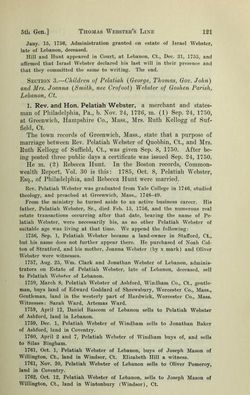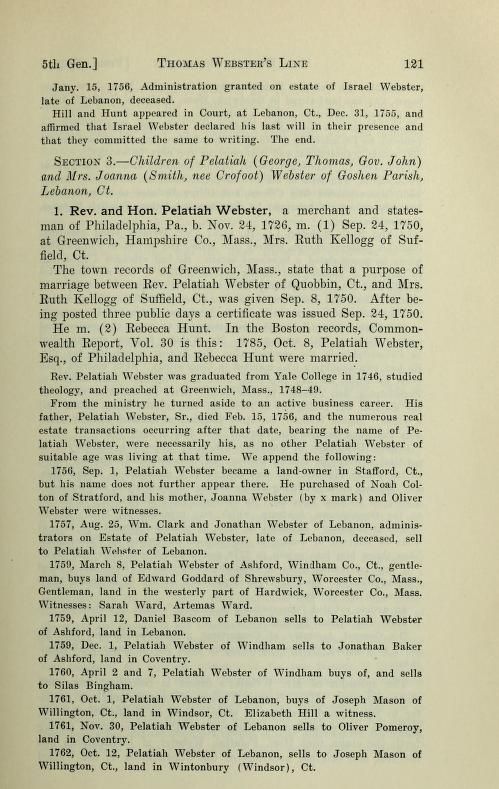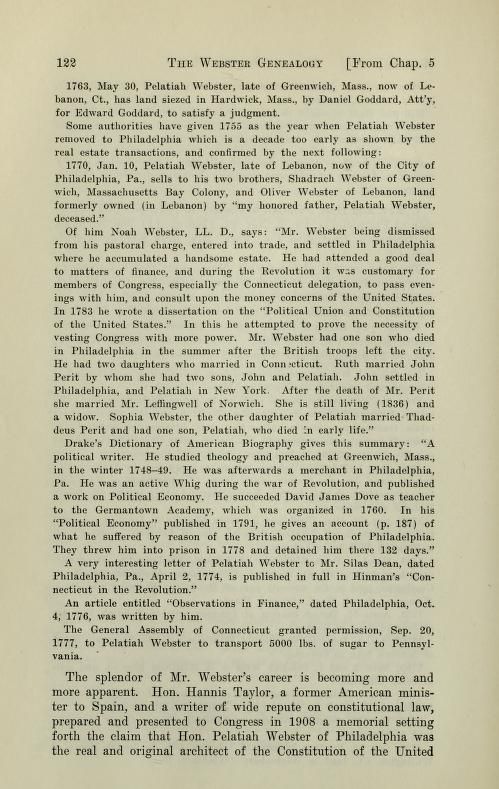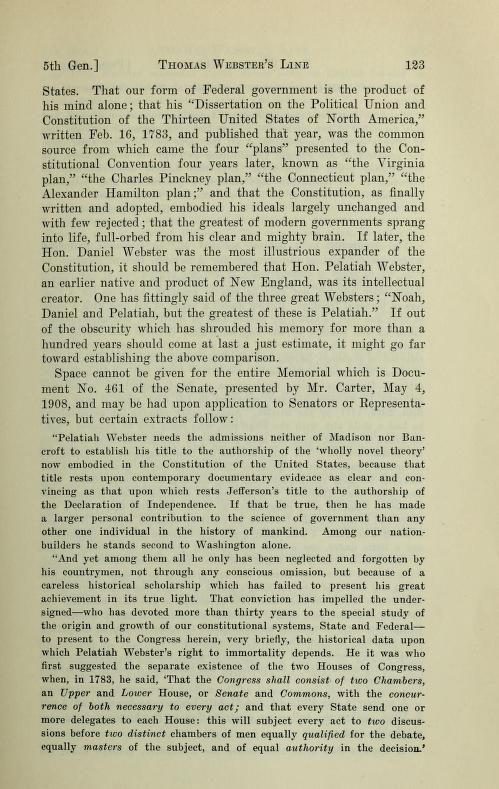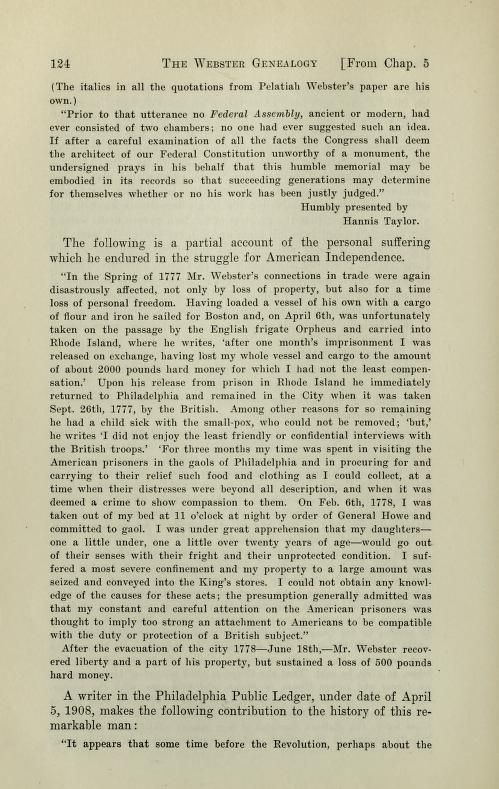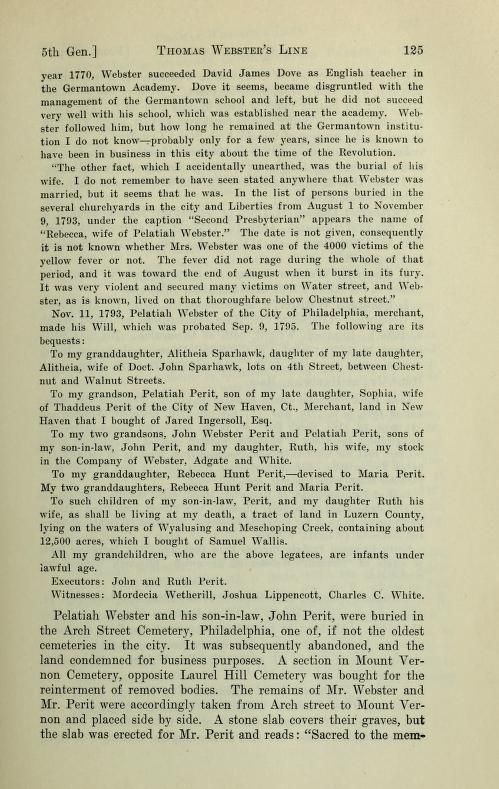"ARCHITECT OF OUR FEDERAL CONSTITUTION".
The Weakness of Brutus exposed: / or, some / Remarks / in / Vindication of the Constitution / proposed by the late / Federal Convention, / against the / Objections and gloomy Fears of that Writer / Humbly offered to the Public, / By / a Citizen of Philadelphia. / Philadelphia, / Printed for, and to be had of John Sparhawk, in Market-Street, / near the Court House / M. DCC. LXXXVII.
12mo., pp. 23.
Written by Pelatiah Webster, a Philadelphia merchant, and author of a number of pamphlets on the finances and government of the United States, most of which he reprinted in his "Political Essays" in Philadelphia in 1791.
Brutus was the signature (of Thomas Treadwell, of Suffolk County, N. Y.?) to a series of sixteen newspaper essays in the New York Journal, which were extensively copied throughout the country. This is an answer to the first essay only, and was published November 4th, 1787.
https://oll.libertyfund.org/page/1787-p-webster-the-weakness-of-brutus-pamphlet
Addressed as "The Reverend and Honorable Pelatiah Webster", Pelatiah Webster II was a direct descendant of Governor John Webster of Connecticut.
Pelatiah Webster II was the eldest child of Pelatiah Sr. and Joanna Smith Crowfoot Webster, and was educated at Yale, graduating there in 1746.
Pelatiah Webster – Junior or "II" – became a minister in Greenwich, Massachusetts, where he met and married Ruth Kellogg in 1750. By 1755 he had removed to Philadelphia where he became a successful merchant and businessman, amassing a small fortune. He became one of the foremost authorities on all matters of trade, finance, currency and resources of the country and whose council was sought and respected by many in the Continental Congress.
In 1776 he began publishing a series of pamphlets which were all compiled into his 1791 "Political Essays on the Nature and Operation of Money, Public Finances, and other Subjects during the American War", some of which were the cause of his arrest and imprisonment by the British in 1778. The year before he had written a letter to Gen. George Washington, reporting on the generally poor conditions under which American Prisoners were being held in Philadelphia. He was held for over 4 months and had an estimated 500 pounds worth of his goods confiscated.
In 1783 he published his "Dissertation on the Political Union and Constitution of the United States of North America", which in effect was the first call for the replacement of the "Articles of Confederation" with a whole new form of a "Federal Government", which eventually came to fruit with the ratification of the U.S. Constitution in 1788. He was also urged by some to run for President against Washington in the first election for that office. The Reverend and Honorable Mr. Webster died in Philadelphia in 1795 and is believed to be at rest in the Mt. Vernon Cemetery there.
"The Continental money is to be considered as a debt fastened on the person and estate of every member of the United States, a debt of great honor and justice, of national honor and justice, not barely empty honor, but that essential honor and credit in which the safety of the state is comprised, and therefore by confession of every body must be punctually and honorably paid in due time; otherwise all security arising from public credit must be lost, all confidence of individuals in our public councils must be destroyed, and great injustice must be done to every possessor of our public currency, to the detriment of all, and ruin of many who have placed most confidence in our public administration: and nothing but shame, scandal, and contempt can ensue, for which nothing but most inevitable necessity can be any reasonable excuse."
— Pelatiah Webster, October 1776
On May 4, 1908, By Act of Document 461 of the U.S. Senate, in the 1st Session of the 60th Congress, Pelatiah Webster was officially recognized as the "Architect of our Federal Constitution".
Founders Online
Pelatiah Webster
• To John Adams from Pelatiah Webster, 13 June 1776 (Adams Papers)
"I Take this opportunity Just to advise You that if Your Congress will Appoint Capt. Job Prince..."
• To George Washington from Pelatiah Webster, 19 November 1777 (Washington Papers)
"I am desired to give a State of the American Prisoners now in this City, which is as Near as I..."
• To Benjamin Franklin from Pelatiah Webster, 2 May 1780 (Franklin Papers)
ALS : American Philosophical Society "I hope you will excuse me, if I interrupt your attention for..."
• To John Adams from Pelatiah Webster, 7 June 1787 (Adams Papers)
"Mr. John Churchman of This City Thinks he has Discover'd a Method by Which the Longitude at Sea..."
https://founders.archives.gov/search/Author%3A%22Webster%2C%20Pelatiah%22
Our Republic's First Economist
Pelatiah Webster (November 24, 1726 – September 4, 1795) was not only America's first economist, an American Patriot, and "Forgotten" Founding Father," but he was officially recognized by the U.S. Senate as "The Architect of Our Federal Constitution" on May 4, 1908!
On the fourth of July we pay homage to our Founding Fathers — the men who gave us our freedom. One of the greatest of these 18th century "giants" was our Nation's first economist, Pelatiah Webster.
— By Percy L. Greaves, Jr.
Read more at the link below and online:
http://jpatton.bellevue.edu/pelatiah-webster-economist.html
Pelatiah Webster and the Constitution
https://www.loc.gov/item/12035342/
Pelatiah Webster, Remarks on the Address of Sixteen Members of the Assembly of Pennsylvania — 12 October 1787
https://press-pubs.uchicago.edu/founders/documents/v1ch9s2.html
Pelatiah Webster account, letterbook, and ciphering book
Pelatiah Webster was a Philadelphia merchant and shipper. This volume is a ledger, 1773-1775, and letterbook, 1782-1792. There is also a ciphering book at the other end of the volume.
https://discover.hsp.org/Record/ead-Am.1815
Journal of a voyage to Charlestown in So. Carolina by Pelatiah Webster in 1765
Edited by T.P. Harrison
Authors: Webster, Pelatiah, 1726-1795 (Main Author); Harrison, Thomas Perrin, 1864-1949 (Added Author).
https://www.familysearch.org/search/catalog/2480069?availability=Online
Eliza Lucas Pinckney: An Independent Woman in the Age of Revolution
By Lorri Glover
Yale University Press, Aug 25, 2020
History - 344 pages
The enthralling story of Eliza Lucas Pinckney, an innovative, highly regarded, and successful woman plantation owner during the Revolutionary era.
Pelatiah Webster, PAGE 286
https://books.google.com/books?id=0lz0DwAAQBAJ&pg=PA286&lpg=PA286&dq=Pelatiah+Webster+Charles+Pinckney&source=bl&ots=2PjelQ8OGe&sig=ACfU3U3Mh13uXzcQ-QG7XXr0w9Z9iNhgUw&hl=en&sa=X&ved=2ahUKEwim9Pbpp6TzAhVtRzABHTXkASAQ6AF6BAgQEAI#v=onepage&q=Pelatiah%20Webster%20Charles%20Pinckney&f=false
Pelatiah Webster, 1726-1795.
American clergyman, Philadelphia merchant and early economist and political theorist
Born in Lebanon, Connecticut, Pelataiah Webster studied theology at Yale, graduating in 1746 and was ordained a Congregationalist minister in 1749. After a period as a preacher in Greenwich, Massachusetts, Webster moved to Philadelphia in 1755, to take up the career as merchant ("as a matter of necessity rather than inclination"). He amassed a small fortune, while also teaching at an academy in nearby Germantown.
Pelatiah Webster was a keen supporter of the American Revolution of 1776. Webster was arrested and imprisoned twice by the British authorities - in 1777 and again in 1778.
Webster one of the earliest commentators on the fiscal conduct and economic consequences of the American revolution. In October 1776, the middle-aged Webster wrote his first economics tract, an article in the Philadelphia newspaper, warning of the dangers of the unbacked paper currency issued by the Continental Congress. To fend off the prospects of inflation. Webster urged the introduction of a national tax to siphon off excess Continental notes. He continued writing as the war progressed. Starting in July 1779, Webster published seven pamphlets under the generic title of Free Trade and Finance. Webster urged the Continental Congress to rely on taxation, rather than foreign loans or printing notes, to fund the war. The continental notes were discontinued in the Spring of 1781.
Seeing the disparate Confederation as politically inadequate for fiscal purposes, Webster urged greater union, and became an early advocate of the federalist cause. In February 1783, Webster published his political Dissertation calling for the establishment of a new federal constitution, outlining a bicameral legislature and an independent federal judiciary. As a result, some historians have taken to calling Pelatiah Webster the "Architect of the Constitution". Although there is no good evidence that the Constitutional congress of 1787 took his model as a blueprint, his Dissertation was reportedly influential on James Madison. Webster agitated in favor the 1787 Constitution against critics in Pennsylvania.
Pelatiah Webster was active during the bank debate of 1785-86. West Pennsylvania farmers, in a bid to obtain easier credit, got the Pennsylvania assembly to vote for the issue of paper money in March 1785. They followed this up with a repeal the charter of the Bank of North America (f.1781) in September 1785, blaming the bank for the scarcity of money and fuming against its de facto monopoly. The Philadelphia merchant community cried foul, and Webster joined Robert Morris, Thomas Paine and others in denouncing paper money, defending the bank and agitating for a revival of the bank charter, arguing point-for-point against the bank's critics. The effort eventually succeeded, and the Bank of NA's charter was revived in March, 1787, just before the constitutional convention.
— Pelatiah Webster, 1726-1795
The History of Economic Thought
https://www.hetwebsite.net/het/profiles/webster.htm
Pelatiah Webster, Sr.
"....gave his eldest son a liberal education, the rest he brought up reputably." He sent his eldest son Pelatiah Jr. to university. The others he made certain were well-educated and otherwise prepared for successful lives and careers.
Inscription on tombstone of Pelatiah Webster, in Cemetery, at Lebanon , Ct. "The body of Mr. Pelatiah Webster lies buried here. He married Mrs. Joanna Smith, by her had eight children, gave his eldest son a liberal education, the rest he brought up reputably. He was a pious and prudent man. Born 17 Nov., 1702. Died 15th Feby., 1756."
Forgotten Founder Pelatiah Webster: America's First Economist
Published July 22, 2019
By Lawrence Reed
Everybody knows who America's first president was, but can you identify the country's first economist?
If any man or woman deserves that description, it is surely the one who wrote this and so much more:
I propose . . . to take off every restraint and limitation from our commerce. Let trade be as free as air. Let every man make the most of his goods in his own way and then he will be satisfied.
His name was Pelatiah Webster. Largely forgotten today, he was regarded as "the American Adam Smith" after his death in 1795 at the age of 68. His wisdom, especially on trade and money matters, deserves a renewed appreciation today.
Webster was born in Lebanon, Connecticut, in 1726. Twenty years later, he graduated from Yale and became a minister in Massachusetts. By 1755, however, the lure of entrepreneurial opportunities took him to the business world of Pennsylvania.
He was an almost instant success as a merchant, amassing a small fortune in the process. His reputation as an authority on matters of trade, finance, and currency was unmatched by anyone in the 13 colonies on the eve of the American Revolution. The Second Continental Congress regularly sought his advice.
In 1776, the same year the Declaration of Independence appeared in America and Smith's The Wealth of Nations debuted in Scotland, Webster started publishing a series of essays on economic matters. In 1777, he authored a famous letter to George Washington in which he reported on the awful conditions suffered by Americans imprisoned by the British. The revelations in that letter and in other writings landed him behind British bars himself for four months in 1778. The Brits ripped off a sizable chunk of his personal wealth, as well.
In 1783, Webster published his Dissertation on the Political Union and Constitution of the United States of North America. It proved to be enormously influential in the run-up to the Constitutional Convention of 1787 and the ratification of the Constitution itself. In 1791, he published a compilation of his pamphlets and articles under the title Political Essays on the Nature and Operation of Money, Public Finances, and other Subjects during the American War. It remains accessible, insightful, and fascinating to this day. You can read it at Liberty Fund's Online Library of Liberty here.
A 1907 article in the Yale Law Journal by Hannis Taylor titled "Pelatiah Webster: The Architect of our Federal Constitution" praises Webster profusely, claiming that "among our nation-builders, Pelatiah Webster stands second to Washington alone." Taylor argued that Webster was sadly neglected by historians "not through any conscious omission, but because of a careless historical scholarship which has failed to present his great achievement in its true light."
Price Controls in Early American History
Indisputably, Webster's behind-the-scenes contributions to the Constitution were immensely significant, though he was squarely in the camp of the Federalists of his day. Personally, I would have planted myself in the opposing camp of the Anti-Federalists, so I would have differed from him on important issues of governance.
On economics, however, Webster penned many excellent insights that make him worthy of the moniker "America's First Economist." Here are just a few:
In my 2008 essay, "The Times That Tried Men's Economic Souls," I recounted the Continental Congress's mistake in resorting to paper money inflation. Webster opposed the practice from the start and later noted its disastrous consequences:
The people of the states had been … put out of humor by so many tender acts, limitations of prices, and other compulsory methods to force value into paper money … and by so many vain funding schemes, declarations and promises, all of which issued from Congress but died under the most zealous efforts to put them into operation and effect.
Within a year of cranking up the printing presses, Congress decreed that the army could requisition supplies at fixed prices. It was a ruinous experiment in price controls that ensured not ample provision but outright destitution. If Congress hadn't heeded the warnings of men like Webster and abolished them quickly, America might well have lost the war. As our first economist observed:
We have suffered more from this cause than from any other cause or calamity. It has killed more men, pervaded and corrupted the choicest interests of our country more, done more injustice even than the enemies.
Webster's experience as a successful businessman undoubtedly influenced his thinking on the virtue of free trade. His pamphlets are laced with eloquent defenses of commercial liberty. "Trade, if left alone," he declared, "will ever make its own way best, and like an irresistible river, will ever run safest, do least mischief and most good, if suffered to run without obstruction in its own natural channel." Furthermore, he wrote:
Freedom of trade, or unrestrained liberty of the subject to hold or dispose of his property as he pleases, is absolutely necessary to the prosperity of every community, and to the happiness of all individuals who compose it….All experience shows that the most effective way to turn a scarcity into a plenty, is to raise the price of the articles wanted…In times of danger, distress, and difficulty every man will use strong endeavors to get his goods to market, in proportion to the necessity and great demand for them; because they will then bring the best price, and every man is fond of embracing golden opportunities and favorable chances….
In times of scarcity, every man will have strong inducements to bring all he can spare to market, because it will then bring the highest price he can ever expect, and consequently the community will have the benefit of all that exists among them, in a much surer manner than any degree of force could extort it, and all to the entire satisfaction of buyer and seller.
My favorite Webster quote on free trade comes from an essay he penned in 1780. This was a guy who knew his economics and didn't hold back when stupid interventions predictably backfired.
Let every man be at liberty to get money as fast as he can; and let the public call for it as fast as public exigence requires. Limitations of our trade have been so often tried, so strongly enforced, and have so constantly failed of the intended effect, and have, in every instance, produced so much injustice and oppression in our dealings, and excited so many quarrels, so much ill-will and chagrin among our people, that they have, in every instance, after some time of most pernicious continuance, been laid aside by a kind of general consent, and even most of their advocates have been convinced of their hurtful tendency, as well as utter impracticability.
When a government goes to war, the pressure to print money proves irresistible. Some people actually think the printing press allows the government to secure labor and material more cheaply than if it raised taxes to pay for them.
But Webster knew that there was nothing magical about a printing press. Everything must be paid for, if not by higher taxes now, then by higher taxes later—in the form of higher prices, as well as higher taxes. His advice to the Congress was to refrain from debauching the currency and pay for what it needed as much as possible by raising taxes. The rest, he argued, could be financed by issuing minimal debt backed by a promise to redeem in precious metal.
Webster wasn't a fan of government debt. When emergencies are over or coffers swell, he urged debt retirement. I wish his advice would be taken in Congress today, where deficit spending is soaring in spite of a booming economy.
…[I]t is a plain maxim that people should always pay their debts when they have a good run of business and have money aplenty; many a man has been distressed for a debt when business and money were scarce, which he had neglected to pay when he could have done it with great ease to himself, had he attended to it in its proper season; this applies to a community or state as well as to a private person.
So much of sound economics reduces to what Pelatiah Webster would likely regard as common sense: Don't spend what you haven't got. Don't mortgage your children's future. Leave free people alone to produce and create. Refrain from cheating your creditors or your customers. Be honest with money. Let trade be unfettered by superstition, fallacy, or the arrogance of officialdom. Honor your contracts. Establish a stable framework under the rule of law so people can go about their business. Keep the peace.
And that's why America's first economist is worth listening to more than two centuries after he lived.
— By LAWRENCE W. REED, President Emeritus, Humphreys Family Senior Fellow, and Ron Manners Ambassador for Global Liberty at the Foundation for Economic Education. He is also author of Real Heroes: Incredible True Stories of Courage, Character, and Conviction and Excuse Me, Professor: Challenging the Myths of Progressivism.
https://tennesseestar.com/2019/07/22/forgotten-founder-pelatiah-webster-americas-first-economist/
History and Genealogy of the Gov. John Webster Family of Connecticut: With Numerous Portraits and Illustrations, Volume 1
By William Holcomb Webster and Melville Reuben Webster
Higginson Book Company, 1993
1646 pages
https://books.google.com/books?id=sFwbAQAAMAAJ&focus=searchwithinvolume&q=Sparhawk
History and Genealogy of the Gov. John Webster Family of Connecticut, with numerous portraits and illustrations
by Webster, William H. [William Holcomb Webster] (1839 – 1896); and Webster, Melville Reuben (1850 – )
Publication Date
1915
Topics
Webster family, Webster, John, d. 1661
Publisher
Rochester, NY
E.R. Andrews Print. Co.
https://archive.org/details/historygenealogy00webs/mode/1up?q=Sparhawk
Extracts from the Itineraries and Other Miscellanies of Ezra Stiles, D. D., LL. D., 1755-1794, with a selection from his correspondence
By Ezra Stiles (1727 – 1795)
Edited by Franklin Bowditch Dexter (1842 – 1920)
Publication Date
1916
Topics
Yale University, genealogy
Publisher
New Haven, Connecticut
Yale University Press
https://archive.org/details/extractsfromitin1755stil/page/579/mode/1up?view=theater
Genealogy of The Sparhawk Family
https://books.google.com/books?id=Xv4UAAAAYAAJ&pg=PA27&lpg=PA27&dq=elizabeth+perkins+Nathaniel+Sparhawk&source=bl&ots=zzT7gH6K_j&sig=ACfU3U2__ELCGoD75-6dGlZ3Fow6KcJ4sA&hl=en&sa=X&ved=2ahUKEwjLx4Dq3J3zAhUXRzABHWmQB2YQ6AF6BAgeEAI#v=onepage&q=elizabeth%20perkins%20Nathaniel%20Sparhawk&f=false
The History of Lynn, Massachusetts —
SPARHAWK Family
https://books.google.com/books?id=Y_pHAQAAMAAJ&pg=PA199&lpg=PA199&dq=elizabeth+perkins+Nathaniel+Sparhawk&source=bl&ots=S4XGU3P09F&sig=ACfU3U1lJZkYHWr5MgoPVFWmScnfc1_3-g&hl=en&sa=X&ved=2ahUKEwj1-JKH5aLzAhWYTTABHUjLAgQ4HhDoAXoECBwQAg#v=onepage&q=elizabeth%20perkins%20Nathaniel%20Sparhawk&f=false
Forgotten Founder Pelatiah Webster:
America's First Economist
Published July 22, 2019
Lawrence W. Reed is President Emeritus, Humphreys Family Senior Fellow, and Ron Manners Ambassador for Global Liberty at the Foundation for Economic Education. He is also author of Real Heroes: Incredible True Stories of Courage, Character, and Conviction and Excuse Me, Professor: Challenging the Myths of Progressivism.
https://tennesseestar.com/2019/07/22/forgotten-founder-pelatiah-webster-americas-first-economist/
Pelatiah Webster's 1795 will bequeathed some of his land in Philadelphia just blocks from Independence Hall and the Liberty Bell to his granddaughter, Alitheia Sparhawk! http://ow.ly/kWoP30ihsu4 #HarvardCNA
@hlslib
#hlslspecialcollections #harvardlaw
8:20 am on Feb 13, 2018
https://mobile.twitter.com/hlslib/status/963417535071780865
Journal of a Voyage to Charlestown in So. Carolina by Pelatiah Webster in 1765
Pelatiah Webster
Society, 1898 - Charleston (S.C.) - 18 pages.
https://books.google.com/books/about/Journal_of_a_Voyage_to_Charlestown_in_So.html?id=m7E-AAAAYAAJ
A Memorial in Behalf of the Architect of Our Federal Constitution, Pelatiah Webster, of Philadelphia, Pa. ...
Hannis 1851-1922 Taylor, Pelatiah 1726-1795 Webster, 1st Session United States 60th Congress
BiblioBazaar, 2016 M08 28 - 58 pages
https://books.google.mw/books?id=PDINvgAACAAJ&source=gbs_book_other_versions_r&cad=4
Pelatiah Webster II is the direct ancestor of Webster and Sparhawk descendants Charles Francis Sparhawk (4th Great-grandson) and 6th Great-granddaughter Brandy Lynn Henderson.
SPARHAWK
History of Newton
https://books.google.com/books?id=4n_ZIXrSssgC&q=Sparhawk#v=snippet&q=Sparhawk&f=false
PELATIAH WEBSTER
https://www.werelate.org/wiki/Person:Peletiah_Webster_(1)
DR. JOHN SPARHAWK
https://www.washingtonpost.com/archive/lifestyle/2001/07/01/our-forefathers-could-kick-your-fathers-butts/15bf855b-b983-4d3c-90db-52570dd2bf39/
"ARCHITECT OF OUR FEDERAL CONSTITUTION".
The Weakness of Brutus exposed: / or, some / Remarks / in / Vindication of the Constitution / proposed by the late / Federal Convention, / against the / Objections and gloomy Fears of that Writer / Humbly offered to the Public, / By / a Citizen of Philadelphia. / Philadelphia, / Printed for, and to be had of John Sparhawk, in Market-Street, / near the Court House / M. DCC. LXXXVII.
12mo., pp. 23.
Written by Pelatiah Webster, a Philadelphia merchant, and author of a number of pamphlets on the finances and government of the United States, most of which he reprinted in his "Political Essays" in Philadelphia in 1791.
Brutus was the signature (of Thomas Treadwell, of Suffolk County, N. Y.?) to a series of sixteen newspaper essays in the New York Journal, which were extensively copied throughout the country. This is an answer to the first essay only, and was published November 4th, 1787.
https://oll.libertyfund.org/page/1787-p-webster-the-weakness-of-brutus-pamphlet
Addressed as "The Reverend and Honorable Pelatiah Webster", Pelatiah Webster II was a direct descendant of Governor John Webster of Connecticut.
Pelatiah Webster II was the eldest child of Pelatiah Sr. and Joanna Smith Crowfoot Webster, and was educated at Yale, graduating there in 1746.
Pelatiah Webster – Junior or "II" – became a minister in Greenwich, Massachusetts, where he met and married Ruth Kellogg in 1750. By 1755 he had removed to Philadelphia where he became a successful merchant and businessman, amassing a small fortune. He became one of the foremost authorities on all matters of trade, finance, currency and resources of the country and whose council was sought and respected by many in the Continental Congress.
In 1776 he began publishing a series of pamphlets which were all compiled into his 1791 "Political Essays on the Nature and Operation of Money, Public Finances, and other Subjects during the American War", some of which were the cause of his arrest and imprisonment by the British in 1778. The year before he had written a letter to Gen. George Washington, reporting on the generally poor conditions under which American Prisoners were being held in Philadelphia. He was held for over 4 months and had an estimated 500 pounds worth of his goods confiscated.
In 1783 he published his "Dissertation on the Political Union and Constitution of the United States of North America", which in effect was the first call for the replacement of the "Articles of Confederation" with a whole new form of a "Federal Government", which eventually came to fruit with the ratification of the U.S. Constitution in 1788. He was also urged by some to run for President against Washington in the first election for that office. The Reverend and Honorable Mr. Webster died in Philadelphia in 1795 and is believed to be at rest in the Mt. Vernon Cemetery there.
"The Continental money is to be considered as a debt fastened on the person and estate of every member of the United States, a debt of great honor and justice, of national honor and justice, not barely empty honor, but that essential honor and credit in which the safety of the state is comprised, and therefore by confession of every body must be punctually and honorably paid in due time; otherwise all security arising from public credit must be lost, all confidence of individuals in our public councils must be destroyed, and great injustice must be done to every possessor of our public currency, to the detriment of all, and ruin of many who have placed most confidence in our public administration: and nothing but shame, scandal, and contempt can ensue, for which nothing but most inevitable necessity can be any reasonable excuse."
— Pelatiah Webster, October 1776
On May 4, 1908, By Act of Document 461 of the U.S. Senate, in the 1st Session of the 60th Congress, Pelatiah Webster was officially recognized as the "Architect of our Federal Constitution".
Founders Online
Pelatiah Webster
• To John Adams from Pelatiah Webster, 13 June 1776 (Adams Papers)
"I Take this opportunity Just to advise You that if Your Congress will Appoint Capt. Job Prince..."
• To George Washington from Pelatiah Webster, 19 November 1777 (Washington Papers)
"I am desired to give a State of the American Prisoners now in this City, which is as Near as I..."
• To Benjamin Franklin from Pelatiah Webster, 2 May 1780 (Franklin Papers)
ALS : American Philosophical Society "I hope you will excuse me, if I interrupt your attention for..."
• To John Adams from Pelatiah Webster, 7 June 1787 (Adams Papers)
"Mr. John Churchman of This City Thinks he has Discover'd a Method by Which the Longitude at Sea..."
https://founders.archives.gov/search/Author%3A%22Webster%2C%20Pelatiah%22
Our Republic's First Economist
Pelatiah Webster (November 24, 1726 – September 4, 1795) was not only America's first economist, an American Patriot, and "Forgotten" Founding Father," but he was officially recognized by the U.S. Senate as "The Architect of Our Federal Constitution" on May 4, 1908!
On the fourth of July we pay homage to our Founding Fathers — the men who gave us our freedom. One of the greatest of these 18th century "giants" was our Nation's first economist, Pelatiah Webster.
— By Percy L. Greaves, Jr.
Read more at the link below and online:
http://jpatton.bellevue.edu/pelatiah-webster-economist.html
Pelatiah Webster and the Constitution
https://www.loc.gov/item/12035342/
Pelatiah Webster, Remarks on the Address of Sixteen Members of the Assembly of Pennsylvania — 12 October 1787
https://press-pubs.uchicago.edu/founders/documents/v1ch9s2.html
Pelatiah Webster account, letterbook, and ciphering book
Pelatiah Webster was a Philadelphia merchant and shipper. This volume is a ledger, 1773-1775, and letterbook, 1782-1792. There is also a ciphering book at the other end of the volume.
https://discover.hsp.org/Record/ead-Am.1815
Journal of a voyage to Charlestown in So. Carolina by Pelatiah Webster in 1765
Edited by T.P. Harrison
Authors: Webster, Pelatiah, 1726-1795 (Main Author); Harrison, Thomas Perrin, 1864-1949 (Added Author).
https://www.familysearch.org/search/catalog/2480069?availability=Online
Eliza Lucas Pinckney: An Independent Woman in the Age of Revolution
By Lorri Glover
Yale University Press, Aug 25, 2020
History - 344 pages
The enthralling story of Eliza Lucas Pinckney, an innovative, highly regarded, and successful woman plantation owner during the Revolutionary era.
Pelatiah Webster, PAGE 286
https://books.google.com/books?id=0lz0DwAAQBAJ&pg=PA286&lpg=PA286&dq=Pelatiah+Webster+Charles+Pinckney&source=bl&ots=2PjelQ8OGe&sig=ACfU3U3Mh13uXzcQ-QG7XXr0w9Z9iNhgUw&hl=en&sa=X&ved=2ahUKEwim9Pbpp6TzAhVtRzABHTXkASAQ6AF6BAgQEAI#v=onepage&q=Pelatiah%20Webster%20Charles%20Pinckney&f=false
Pelatiah Webster, 1726-1795.
American clergyman, Philadelphia merchant and early economist and political theorist
Born in Lebanon, Connecticut, Pelataiah Webster studied theology at Yale, graduating in 1746 and was ordained a Congregationalist minister in 1749. After a period as a preacher in Greenwich, Massachusetts, Webster moved to Philadelphia in 1755, to take up the career as merchant ("as a matter of necessity rather than inclination"). He amassed a small fortune, while also teaching at an academy in nearby Germantown.
Pelatiah Webster was a keen supporter of the American Revolution of 1776. Webster was arrested and imprisoned twice by the British authorities - in 1777 and again in 1778.
Webster one of the earliest commentators on the fiscal conduct and economic consequences of the American revolution. In October 1776, the middle-aged Webster wrote his first economics tract, an article in the Philadelphia newspaper, warning of the dangers of the unbacked paper currency issued by the Continental Congress. To fend off the prospects of inflation. Webster urged the introduction of a national tax to siphon off excess Continental notes. He continued writing as the war progressed. Starting in July 1779, Webster published seven pamphlets under the generic title of Free Trade and Finance. Webster urged the Continental Congress to rely on taxation, rather than foreign loans or printing notes, to fund the war. The continental notes were discontinued in the Spring of 1781.
Seeing the disparate Confederation as politically inadequate for fiscal purposes, Webster urged greater union, and became an early advocate of the federalist cause. In February 1783, Webster published his political Dissertation calling for the establishment of a new federal constitution, outlining a bicameral legislature and an independent federal judiciary. As a result, some historians have taken to calling Pelatiah Webster the "Architect of the Constitution". Although there is no good evidence that the Constitutional congress of 1787 took his model as a blueprint, his Dissertation was reportedly influential on James Madison. Webster agitated in favor the 1787 Constitution against critics in Pennsylvania.
Pelatiah Webster was active during the bank debate of 1785-86. West Pennsylvania farmers, in a bid to obtain easier credit, got the Pennsylvania assembly to vote for the issue of paper money in March 1785. They followed this up with a repeal the charter of the Bank of North America (f.1781) in September 1785, blaming the bank for the scarcity of money and fuming against its de facto monopoly. The Philadelphia merchant community cried foul, and Webster joined Robert Morris, Thomas Paine and others in denouncing paper money, defending the bank and agitating for a revival of the bank charter, arguing point-for-point against the bank's critics. The effort eventually succeeded, and the Bank of NA's charter was revived in March, 1787, just before the constitutional convention.
— Pelatiah Webster, 1726-1795
The History of Economic Thought
https://www.hetwebsite.net/het/profiles/webster.htm
Pelatiah Webster, Sr.
"....gave his eldest son a liberal education, the rest he brought up reputably." He sent his eldest son Pelatiah Jr. to university. The others he made certain were well-educated and otherwise prepared for successful lives and careers.
Inscription on tombstone of Pelatiah Webster, in Cemetery, at Lebanon , Ct. "The body of Mr. Pelatiah Webster lies buried here. He married Mrs. Joanna Smith, by her had eight children, gave his eldest son a liberal education, the rest he brought up reputably. He was a pious and prudent man. Born 17 Nov., 1702. Died 15th Feby., 1756."
Forgotten Founder Pelatiah Webster: America's First Economist
Published July 22, 2019
By Lawrence Reed
Everybody knows who America's first president was, but can you identify the country's first economist?
If any man or woman deserves that description, it is surely the one who wrote this and so much more:
I propose . . . to take off every restraint and limitation from our commerce. Let trade be as free as air. Let every man make the most of his goods in his own way and then he will be satisfied.
His name was Pelatiah Webster. Largely forgotten today, he was regarded as "the American Adam Smith" after his death in 1795 at the age of 68. His wisdom, especially on trade and money matters, deserves a renewed appreciation today.
Webster was born in Lebanon, Connecticut, in 1726. Twenty years later, he graduated from Yale and became a minister in Massachusetts. By 1755, however, the lure of entrepreneurial opportunities took him to the business world of Pennsylvania.
He was an almost instant success as a merchant, amassing a small fortune in the process. His reputation as an authority on matters of trade, finance, and currency was unmatched by anyone in the 13 colonies on the eve of the American Revolution. The Second Continental Congress regularly sought his advice.
In 1776, the same year the Declaration of Independence appeared in America and Smith's The Wealth of Nations debuted in Scotland, Webster started publishing a series of essays on economic matters. In 1777, he authored a famous letter to George Washington in which he reported on the awful conditions suffered by Americans imprisoned by the British. The revelations in that letter and in other writings landed him behind British bars himself for four months in 1778. The Brits ripped off a sizable chunk of his personal wealth, as well.
In 1783, Webster published his Dissertation on the Political Union and Constitution of the United States of North America. It proved to be enormously influential in the run-up to the Constitutional Convention of 1787 and the ratification of the Constitution itself. In 1791, he published a compilation of his pamphlets and articles under the title Political Essays on the Nature and Operation of Money, Public Finances, and other Subjects during the American War. It remains accessible, insightful, and fascinating to this day. You can read it at Liberty Fund's Online Library of Liberty here.
A 1907 article in the Yale Law Journal by Hannis Taylor titled "Pelatiah Webster: The Architect of our Federal Constitution" praises Webster profusely, claiming that "among our nation-builders, Pelatiah Webster stands second to Washington alone." Taylor argued that Webster was sadly neglected by historians "not through any conscious omission, but because of a careless historical scholarship which has failed to present his great achievement in its true light."
Price Controls in Early American History
Indisputably, Webster's behind-the-scenes contributions to the Constitution were immensely significant, though he was squarely in the camp of the Federalists of his day. Personally, I would have planted myself in the opposing camp of the Anti-Federalists, so I would have differed from him on important issues of governance.
On economics, however, Webster penned many excellent insights that make him worthy of the moniker "America's First Economist." Here are just a few:
In my 2008 essay, "The Times That Tried Men's Economic Souls," I recounted the Continental Congress's mistake in resorting to paper money inflation. Webster opposed the practice from the start and later noted its disastrous consequences:
The people of the states had been … put out of humor by so many tender acts, limitations of prices, and other compulsory methods to force value into paper money … and by so many vain funding schemes, declarations and promises, all of which issued from Congress but died under the most zealous efforts to put them into operation and effect.
Within a year of cranking up the printing presses, Congress decreed that the army could requisition supplies at fixed prices. It was a ruinous experiment in price controls that ensured not ample provision but outright destitution. If Congress hadn't heeded the warnings of men like Webster and abolished them quickly, America might well have lost the war. As our first economist observed:
We have suffered more from this cause than from any other cause or calamity. It has killed more men, pervaded and corrupted the choicest interests of our country more, done more injustice even than the enemies.
Webster's experience as a successful businessman undoubtedly influenced his thinking on the virtue of free trade. His pamphlets are laced with eloquent defenses of commercial liberty. "Trade, if left alone," he declared, "will ever make its own way best, and like an irresistible river, will ever run safest, do least mischief and most good, if suffered to run without obstruction in its own natural channel." Furthermore, he wrote:
Freedom of trade, or unrestrained liberty of the subject to hold or dispose of his property as he pleases, is absolutely necessary to the prosperity of every community, and to the happiness of all individuals who compose it….All experience shows that the most effective way to turn a scarcity into a plenty, is to raise the price of the articles wanted…In times of danger, distress, and difficulty every man will use strong endeavors to get his goods to market, in proportion to the necessity and great demand for them; because they will then bring the best price, and every man is fond of embracing golden opportunities and favorable chances….
In times of scarcity, every man will have strong inducements to bring all he can spare to market, because it will then bring the highest price he can ever expect, and consequently the community will have the benefit of all that exists among them, in a much surer manner than any degree of force could extort it, and all to the entire satisfaction of buyer and seller.
My favorite Webster quote on free trade comes from an essay he penned in 1780. This was a guy who knew his economics and didn't hold back when stupid interventions predictably backfired.
Let every man be at liberty to get money as fast as he can; and let the public call for it as fast as public exigence requires. Limitations of our trade have been so often tried, so strongly enforced, and have so constantly failed of the intended effect, and have, in every instance, produced so much injustice and oppression in our dealings, and excited so many quarrels, so much ill-will and chagrin among our people, that they have, in every instance, after some time of most pernicious continuance, been laid aside by a kind of general consent, and even most of their advocates have been convinced of their hurtful tendency, as well as utter impracticability.
When a government goes to war, the pressure to print money proves irresistible. Some people actually think the printing press allows the government to secure labor and material more cheaply than if it raised taxes to pay for them.
But Webster knew that there was nothing magical about a printing press. Everything must be paid for, if not by higher taxes now, then by higher taxes later—in the form of higher prices, as well as higher taxes. His advice to the Congress was to refrain from debauching the currency and pay for what it needed as much as possible by raising taxes. The rest, he argued, could be financed by issuing minimal debt backed by a promise to redeem in precious metal.
Webster wasn't a fan of government debt. When emergencies are over or coffers swell, he urged debt retirement. I wish his advice would be taken in Congress today, where deficit spending is soaring in spite of a booming economy.
…[I]t is a plain maxim that people should always pay their debts when they have a good run of business and have money aplenty; many a man has been distressed for a debt when business and money were scarce, which he had neglected to pay when he could have done it with great ease to himself, had he attended to it in its proper season; this applies to a community or state as well as to a private person.
So much of sound economics reduces to what Pelatiah Webster would likely regard as common sense: Don't spend what you haven't got. Don't mortgage your children's future. Leave free people alone to produce and create. Refrain from cheating your creditors or your customers. Be honest with money. Let trade be unfettered by superstition, fallacy, or the arrogance of officialdom. Honor your contracts. Establish a stable framework under the rule of law so people can go about their business. Keep the peace.
And that's why America's first economist is worth listening to more than two centuries after he lived.
— By LAWRENCE W. REED, President Emeritus, Humphreys Family Senior Fellow, and Ron Manners Ambassador for Global Liberty at the Foundation for Economic Education. He is also author of Real Heroes: Incredible True Stories of Courage, Character, and Conviction and Excuse Me, Professor: Challenging the Myths of Progressivism.
https://tennesseestar.com/2019/07/22/forgotten-founder-pelatiah-webster-americas-first-economist/
History and Genealogy of the Gov. John Webster Family of Connecticut: With Numerous Portraits and Illustrations, Volume 1
By William Holcomb Webster and Melville Reuben Webster
Higginson Book Company, 1993
1646 pages
https://books.google.com/books?id=sFwbAQAAMAAJ&focus=searchwithinvolume&q=Sparhawk
History and Genealogy of the Gov. John Webster Family of Connecticut, with numerous portraits and illustrations
by Webster, William H. [William Holcomb Webster] (1839 – 1896); and Webster, Melville Reuben (1850 – )
Publication Date
1915
Topics
Webster family, Webster, John, d. 1661
Publisher
Rochester, NY
E.R. Andrews Print. Co.
https://archive.org/details/historygenealogy00webs/mode/1up?q=Sparhawk
Extracts from the Itineraries and Other Miscellanies of Ezra Stiles, D. D., LL. D., 1755-1794, with a selection from his correspondence
By Ezra Stiles (1727 – 1795)
Edited by Franklin Bowditch Dexter (1842 – 1920)
Publication Date
1916
Topics
Yale University, genealogy
Publisher
New Haven, Connecticut
Yale University Press
https://archive.org/details/extractsfromitin1755stil/page/579/mode/1up?view=theater
Genealogy of The Sparhawk Family
https://books.google.com/books?id=Xv4UAAAAYAAJ&pg=PA27&lpg=PA27&dq=elizabeth+perkins+Nathaniel+Sparhawk&source=bl&ots=zzT7gH6K_j&sig=ACfU3U2__ELCGoD75-6dGlZ3Fow6KcJ4sA&hl=en&sa=X&ved=2ahUKEwjLx4Dq3J3zAhUXRzABHWmQB2YQ6AF6BAgeEAI#v=onepage&q=elizabeth%20perkins%20Nathaniel%20Sparhawk&f=false
The History of Lynn, Massachusetts —
SPARHAWK Family
https://books.google.com/books?id=Y_pHAQAAMAAJ&pg=PA199&lpg=PA199&dq=elizabeth+perkins+Nathaniel+Sparhawk&source=bl&ots=S4XGU3P09F&sig=ACfU3U1lJZkYHWr5MgoPVFWmScnfc1_3-g&hl=en&sa=X&ved=2ahUKEwj1-JKH5aLzAhWYTTABHUjLAgQ4HhDoAXoECBwQAg#v=onepage&q=elizabeth%20perkins%20Nathaniel%20Sparhawk&f=false
Forgotten Founder Pelatiah Webster:
America's First Economist
Published July 22, 2019
Lawrence W. Reed is President Emeritus, Humphreys Family Senior Fellow, and Ron Manners Ambassador for Global Liberty at the Foundation for Economic Education. He is also author of Real Heroes: Incredible True Stories of Courage, Character, and Conviction and Excuse Me, Professor: Challenging the Myths of Progressivism.
https://tennesseestar.com/2019/07/22/forgotten-founder-pelatiah-webster-americas-first-economist/
Pelatiah Webster's 1795 will bequeathed some of his land in Philadelphia just blocks from Independence Hall and the Liberty Bell to his granddaughter, Alitheia Sparhawk! http://ow.ly/kWoP30ihsu4 #HarvardCNA
@hlslib
#hlslspecialcollections #harvardlaw
8:20 am on Feb 13, 2018
https://mobile.twitter.com/hlslib/status/963417535071780865
Journal of a Voyage to Charlestown in So. Carolina by Pelatiah Webster in 1765
Pelatiah Webster
Society, 1898 - Charleston (S.C.) - 18 pages.
https://books.google.com/books/about/Journal_of_a_Voyage_to_Charlestown_in_So.html?id=m7E-AAAAYAAJ
A Memorial in Behalf of the Architect of Our Federal Constitution, Pelatiah Webster, of Philadelphia, Pa. ...
Hannis 1851-1922 Taylor, Pelatiah 1726-1795 Webster, 1st Session United States 60th Congress
BiblioBazaar, 2016 M08 28 - 58 pages
https://books.google.mw/books?id=PDINvgAACAAJ&source=gbs_book_other_versions_r&cad=4
Pelatiah Webster II is the direct ancestor of Webster and Sparhawk descendants Charles Francis Sparhawk (4th Great-grandson) and 6th Great-granddaughter Brandy Lynn Henderson.
SPARHAWK
History of Newton
https://books.google.com/books?id=4n_ZIXrSssgC&q=Sparhawk#v=snippet&q=Sparhawk&f=false
PELATIAH WEBSTER
https://www.werelate.org/wiki/Person:Peletiah_Webster_(1)
DR. JOHN SPARHAWK
https://www.washingtonpost.com/archive/lifestyle/2001/07/01/our-forefathers-could-kick-your-fathers-butts/15bf855b-b983-4d3c-90db-52570dd2bf39/
